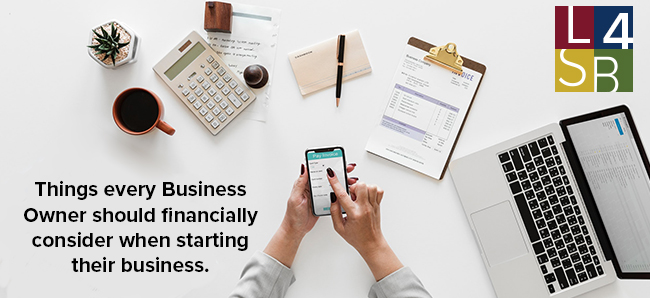Banking and the Small Business Owner
The Corporate Veil: Don’t pierce it!
“Piercing the Corporate Veil” refers to the situation when a court puts aside the protections that are normally associated with an incorporation. The very reason you went to the trouble and expense to incorporate in the first place will be rendered void if you do not routinely exercise a separation of your person from your business entity. As a reminder, one of the most compelling reasons to incorporate is to ensure that your personal assets are considered separate from the business, therefore protecting personal assets from being taken into consideration for settling business debts. Ways to prevent a piercing of the veil is to be vigilant that you are not commingling personal finances with the companies (this means pay your personal bills from your personal bank account and business bills from your business bank account), refrain from using company assets for personal use and always make sure transactions involving other officers and shareholders are by the book.
Have more than one signer on your bank account
You don’t want to give too many people access to your company’s bank accounts, but it is important to make sure there is one additional signer on the account than just you. Why you ask? The answer is simple. All human beings are potential candidates for illness, disease or death. The simple fact that as a business owner you could be involved in a car wreck, accident or somehow incapacitated, just like all the rest of us. Making sure someone else can pay your employees and vendors is crucial for a business to stay afloat during an emergency or transition. Bankers cannot share information about transactions, balances or move money around unless specifically request by a signer on the account. If the only signer for your business’s account is in a coma- it will be a long time and several court actions later to get the money moving again.
Cash Flow is KING
It is called a line of credit. Look into it and get one… even if it is just a small one. If your business is new and cannot qualify for credit on its own, you can collateralize a business line of credit with a personal asset and have the business service the loan payments. The simple fact of the matter is it is almost impossible to anticipate when you will be paid by clients. Especially when starting out, cash flow can be tight for the small business owner. In order to stay in business, it is important to have some “emergency funds” put aside that can be easily swept into your business’s operating account should you be running a little short. A line of credit is different than a credit card for a few reasons. Normally, it is a lower interest rate than a credit card and since it is a bank product you can move funds into the company’s operating account without having to do a “Cash Advance” off a credit card. Cash Advances off a credit card usually always have exorbitant fees and interest associated with it. A line of credit, if used correctly, can make sure you meet payroll and have the supplies you need in between invoicing for work and slow paying clients.
Taking on a Partner? Perform a Financial Interview
Taking on a Partner for your business can be rewarding and under the right circumstances result in faster growth and profitability. However, picking the wrong partner can be just as detrimental to a company as declaring bankruptcy. Here is the thing. Anytime anyone owns more than 25% of a business they will be asked for their financials and to give their Personal Guarantee on loans, vendor agreements, pretty much anything that may require the issuance of credit. Undoubtedly, when a company needs loans or to negotiate new vendor contracts, there is a lot on the line. When the growth or livelihood of your company is relying on the approval of a loan, the underwriting process is not the time to learn your business partner has been bankrupt, been the subject of garnishments and has a gambling problem. Long story short, if your business partner is UN-LENDABLE that means your business is too.
Make sure your company’s Operating Agreement has strong language around the importance of Partners being financially fit and staying that way. If your Operating Agreement states Partners must maintain certain personal credit scores, debt to income ratios and refrain from undesirable spending habits such as gambling, then they have to, or they forfeit their ability to remain a Partner.
The best way to avoid any potential drama of course is to start out with total financial transparency.
Any potential partner should be willing to submit a Personal Financial Statement prior to inking the Partnership Deal.
A Personal Financial Statement or a PFS, is a document in which an individual identifies all their assets and liabilities as well as any other financial transactions they may be a Guarantor on. It also requires the person to identify other business ownership and Trust affiliations they may have. Additionally, ask for supporting bank statements to support the assets listed on the PFS. Really, it would be wise to ask for several months’ worth so you can see for yourself if your potential business partner is managing their finances correctly. Lastly, ask for a couple years’ worth of personal tax returns. Did they file their taxes? Did they pay what was due? Is their tax return “healthy” meaning a bank would consider lending to them?
Speaking of taxes……
No one wants to pay taxes, I get it. However, it is important that business owners understand the following: Taxes are inevitable, and you must pay them. If you avoid taxes by not filing your tax returns or not making payments, your going to have a lot of problems down the line. If you or your accountant are taking every deduction possible and ending up with tax returns that show little to no profit or negative income, don’t think you will qualify for a loan anytime soon. Realistically, you will most likely need to put 3-7 years of “good” tax returns between a “bad” tax return in order to be lendable. I’m not advocating for overpayment of taxes, what I am suggesting is you accept that as a business owner you need to pay your fair share of taxes, in a timely manner; especially if there is any possibility you will need to borrow money in the future. Chances are, if you stay in business for very long, you will need a loan at some point. So, make sure your business’s Tax Returns are not the reason your business might not qualify for a loan.




